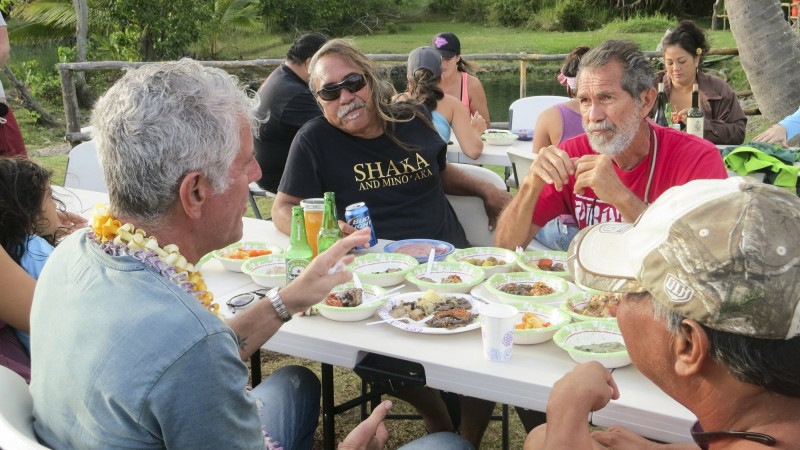I have, in my 14 years of traveling the world in search of kicks, seen many things. But I want to tell you that my experience during the closing sequence of this episode of “Parts Unknown” was — short of watching the birth of my daughter — the most amazing. I hope your TV set is big enough to convey the sense of being where I was, and having something that … large … come at you from the depths. I suspect you’d need an Imax. Absolutely breathtaking.
Those of us who were not born in Hawaii, who do not live there, can be forgiven, I hope, for imagining it a paradise. It has been sold as such to many a generation of white guys of a certain age: warm, “exotic,” festooned with palm trees both real and on shirts, populated (the brochures would have you believe) by friendly musicians, brimming with the spirit of aloha and dusky-skinned women who dance a lot.
As patiently, as often or as stridently as actual Hawaiians might want to disabuse us of these notions — pointing out that unemployment on the islands is brutal that young Hawaiians are finding it nearly impossible to find affordable housing in the communities they were born in, that traffic gets worse every year — we have a hard time seeing anything but gin-clear water, green mountains and the kind of place we’d like to die, drifting off in a hammock: perhaps with the sound of ukuleles in the distance, the only immediate sign of death is the shaker glass full of Mai Tai that falls from our liver-spotted hand.
And it is those things, surely: A place where a gentleman such as myself might spend the rest of his years, padding about in a sarong, smoking extravagantly good weed, eating pig in many delicious, delicious forms.
But Hawaii is actually much, much cooler than we know. MUCH cooler.
It’s both the most American place left in America (in the best and worse senses of that word) and the least American place (in only the best sense). It’s Main Street America in so many ways: socially conservative, family-oriented, fairly straight-laced in its appetites, suspicious of outsiders and shot through with all the usual suspects of American business you’d want, need and expect from Wasilla to Waco to St. Paul.
And it’s also deliriously, deliciously, not American at all: its spine, its DNA, its soul, the descendants of warrior watermen — the original people who navigated their way across the Pacific and settled the islands — and Okinawans, mainland Japanese, Chinese, Filipinos, Vietnamese.
This is a glorious stew similar to some of my other favorite deep gene pools, Singapore and Malaysia, where two people meeting at a party have to inquire each others’ parents were and where they might have come from to untangle the question of exactly who’s who. Everybody too mixed up to hate anybody in particular. This fits in nicely to my probably naive theory that we can all bone our way to world peace eventually, but that’s another matter.
Point is: how can you not love a place that embraces taco rice? What a journey that dish has made: a fake Mexican dish created by Okinawans for homesick, non-Mexican American GIs, eventually embraced by the Japanese, the spoor then migrating back to America to be embraced anew.
Or Spam musubi? Does mutated, cargo cult cuisine get any better? Spam noodles? Chicken katsu with potato macaroni salad?
Every great culture, eventually, throws a pig or other large animal into a hole in the ground — and the Hawaiian version is, unsurprisingly, particularly delicious. But it’s the beef patty with shiny gravy, the mash-ups of Japanese and American diner, Filipino and Vietnamese that make me happiest.
The food, at every level, from casual to fine dining, by fully exploiting the awesomeness of that cultural mix, gets better and better and better every year.
The place where I was happiest in Hawaii was the place everybody (native Hawaiians included) insisted that I would probably be least happy — or least welcome: Moloka’i. Those proud, tough, obstinate, motherf***ers (and I mean that in the most admiring sense I could possibly use that word) are exactly the kind of people we need to save us all from the worst of “progress.” We need people like that in post-Bloomberg New York. Bubba Gump and The Guy Fieri Dome would have never dared to soil my beloved city — and Donald Trump would be regularly punched in the face.
In short, paradise.
I was treated with enormous kindness and generosity everywhere I went — nowhere more so than Moloka’i. My ignorance and naive preconceptions tolerated with patience and good grace. This is one haole who feels very, very honored and grateful for the many kindnesses shown me.
A special thanks to the man, the legend, Shep Gordon, talent manager extraordinaire, the man who can single-handedly move chefs from their powerless huddle in the back stairs service entrance to the big stage — and changed the world many times over. He was my host with the absolute most in Maui. If you have not seen Mike Myers’ film about Shep’s outrageously extraordinary life, “Supermensch,” you should do so immediately.
